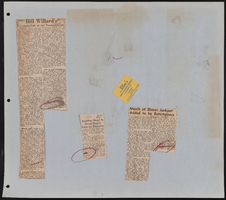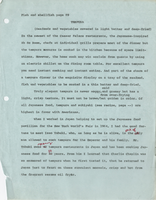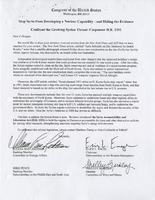Search the Special Collections and Archives Portal
Search Results
Celesta Lowe oral history interview
Identifier
Abstract
Oral history interview with Celesta Lowe conducted by Patrick W. Canlton on February 06, 2002 for the Boyer Early Las Vegas Oral History Project. Lowe begins by discussing her early life in Baker, California and her father’s role as a station agent for the Tonopah Tidewater Railroad during the 1920s and 1930s. Lowe then describes her family moving to Las Vegas, Nevada in the 1940s. Lowe chronicles the process state legislatures took to open Nevada Southern University in 1957 and her role as an administrative assistant in the main office of the school. Lowe recounts her career at Nevada Southern University, the expansion of the campus, and renaming it University of Nevada, Las Vegas. Lastly, Lowe talks about her switch from an administrative assistant to a librarian at UNLV.
Archival Collection
Larry Ruvo oral history interview
Identifier
Abstract
Oral history interview with Larry Ruvo conducted by David G. Schwartz on January 27, 2009 for the Remembering Jay Sarno Oral History Project. Ruvo begins by discussing his position as a front desk clerk at Caesar’s Palace in Las Vegas, Nevada in the 1970s. Ruvo then describes how Jay Sarno changed the casino industry by designing Caesar’s Palace with a single theme. Ruvo then chronicles how gaming gradually was legalized in more areas throughout the world and how Sarno capitalized on making Caesar’s Palace an iconic casino which made people want to travel to Las Vegas. Lastly, Ruvo discusses Sarno’s focus on offering both gaming and entertainment options for guests at Caesar's Palace.
Archival Collection
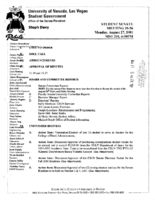
Meeting minutes for Consolidated Student Senate, University of Nevada, Las Vegas, August 27, 2001
Date
Archival Collection
Description
Text

Anita Tijerina Revilla oral history interview: transcript
Date
Archival Collection
Description
Oral history interview with Anita Tijerina Revilla conducted by Marcela Rodriguez-Campo on October 09, 2018 for the Latinx Voices of Southern Nevada Oral History Project. In this interview, Revilla discusses her early life in San Antonio, Texas. She talks about her decision to make education a priority, figuring out the college application process on her own, and her initial interest in social justice. Revilla talks about how her critical consciousness was developed, and her pedagogical approach to teaching. Revilla describes her role in the 2006 May Day march, advocating advocating for the queer community, and disrupting oppressive systems to increase educational access for students. Lastly, Revilla discusses ethnic studies and the history of inequality in the United States.
Text
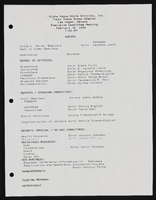
Alpha Kappa Alpha Sorority, Theta Theta Omega Chapter executive committee meeting agendas
Date
Archival Collection
Description
From the Alpha Kappa Alpha Sorority, Incorporated, Theta Theta Omega Chapter Records (MS-01014) -- Chapter records file.
Text

Transcript of interview with Sandra Peña by Lada Mead and Stefani Evans, March 27, 2017
Date
Archival Collection
Description
Sandra Peña’s story begins in East Los Angeles, where she spent her first fifteen years with her parents (both from Michoacán, Mexico), and her younger sister. The father's managerial position at Master Products allowed the family to live rent-free in a company-owned house behind the main factory, because he collected the rents for the company's two other dwellings. In this interview, Peña recalls the family move to Porterville, in California's Central Valley, her return to Los Angeles at nineteen, and her work with Parson’s Dillingham, a contractor for the Metrolink rail system. She draws the link between the Los Angeles and Las Vegas construction communities by describing her husband's move to Las Vegas to find work; a chance Las Vegas encounter with a friend from Chino, California; her ability to gain employment in Las Vegas at Parson’s, a company that had joint ventured with Parson’s Dillingham, and her move from there to Richardson Construction, a local minority-owned company. As Peña says, "It's kind of all intermingled. Even if you go here and you go there, it's like everybody knows everybody." Throughout, Peña weaves her family story into the narrative as she describes her youth, the birth of her son, the illness and death of her father, and her family's participation in her current employment with Richardson. As she remembers the people, places, and events of her life, Peña speaks to the ways one woman of color built on her interstate construction connections and rose in a male-dominated industry.
Text


